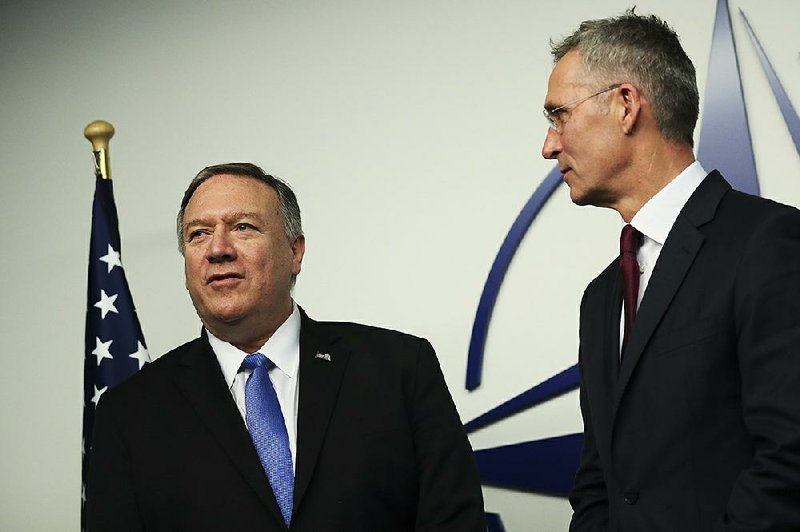Secretary of State Mike Pompeo was dragged into the House impeachment inquiry Wednesday, with the recounting of emails and conversations linking him more closely to the effort to pressure Ukraine to investigate President Donald Trump's political rivals than was previously known.
The accounts provided in sworn testimony by the U.S. ambassador to the European Union, Gordon Sondland, prompted fresh calls for Pompeo to testify on Capitol Hill and explain his actions toward a Ukraine policy that he has at times refused to discuss and at other times has defended as "wholly appropriate."
Sondland said several senior U.S. officials knew about a "quid pro quo" linking a White House visit for Ukrainian President Volodymyr Zelenskiy to investigations into Trump's political rivals. In addition to Pompeo, Sondland said, acting White House Chief of Staff Mick Mulvaney and then-national security adviser John Bolton were aware of the effort.
One of the emails Sondland divulged is an Aug. 11 correspondence in which he describes to Pompeo's senior aides Lisa Kenna and Ulrich Brechbuhl the statement at the heart of the quid pro quo allegations.
Sondland said he told the two aides that he had "negotiated a statement" with Ukrainian officials that "will hopefully make the boss happy enough to authorize an invitation."
Kenna replied, "Gordon, I'll pass to S," referring to the secretary of state.
Sondland and others have testified that the statement would entail Ukraine announcing investigations into Burisma, the Ukrainian energy company that employed the son of former Vice President Joe Biden, and into an unfounded conspiracy theory about the 2016 election. Ukraine's president would gain a meeting at the White House after issuing the statement.
At the time, Zelenskiy was seeking the meeting to project that his country had the support of the United States as it tried to fend off a Russian-backed insurgency. By September, Ukrainians had also become aware that the United States had suspended about $400 million in military aid, Sondland testified.
Eleven days after emailing Kenna and Brechbuhl, Sondland emailed Pompeo to propose that Zelenskiy and Trump meet in Warsaw. The Ukrainian president could then "look him in the eye and tell him that once Ukraine's new justice folks are in place," he could move forward on "those issues of importance" to Trump, Sondland said.
"Hopefully that will break the logjam," Sondland said.
"Yes," replied Pompeo.
Sondland testified that because Pompeo listened in on the July 25 call between Trump and Zelenskiy, he would have known the "issues of importance" to the president were the investigations into the 2016 election and Burisma.
Pompeo, visiting NATO leaders in Brussels on Wednesday, rebuffed a question about Sondland's testimony.
"I didn't see a single thing today. I was working," he told reporters. "Sounds like you might not have been. I was in meetings all day and haven't had a chance to see any of that testimony."
Later in the day, Pompeo did not deny the main substance of Sondland's remarks, but his spokeswoman, Morgan Ortagus, issued a statement saying Pompeo was never told by Sondland that Trump was "linking aid to investigations of political opponents."
A key allegation in Sondland's testimony is that he told Pompeo about plans to secure a White House meeting for Zelenskiy in exchange for the announcement of the political investigations.
"Secretary Pompeo's refusal the past several weeks to defend career diplomats looks even uglier now that we understand he knew about the White House pressure campaign and demand for a quid pro quo," said Steven Pifer, a former U.S. ambassador to Ukraine.
In his testimony, Sondland said he regretted that he could not recount all of his conversations with perfect clarity and attributed that to the State Department preventing him from handing over his text messages and emails to the committee.
When asked, Pompeo said he would not recuse himself from State Department decisions related to turning over documents.
"I'm not gonna recuse myself from this," he told reporters. "I know precisely what American policy was with respect to Ukraine. I was working on it, and I'm very proud of what we've accomplished. There were remarkable outcomes for the Ukrainian people. I hope that we're able to continue to do so."
Information for this article was contributed by Carol Morello, Seung Min Kim and Sean Sullivan of The Washington Post.
A Section on 11/21/2019
